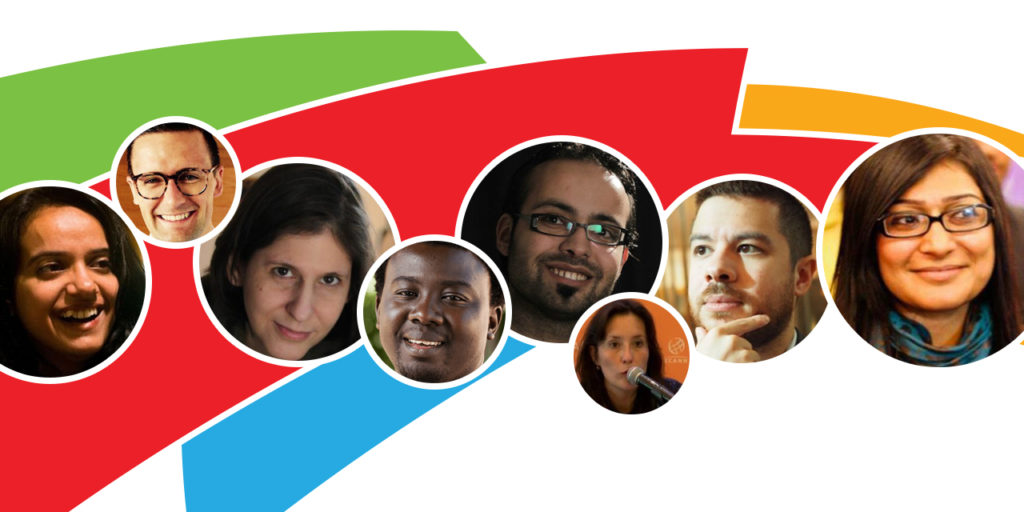With only a few weeks to go until RightsCon Toronto, we are highlighting the vital work of our community members around the world in defending and extending human rights in the digital age.
Melanio Escobar is a Venezuelan activist, journalist, and technologist working to protect secure communications and free expression online in Latin America.
From 2013 to 2014, Venezuela was in great chaos, with months of daily demonstrations protesting the economic crisis and increasing restrictions on basic human rights. The government imposed heavy crackdowns, arresting hundreds of protesters — many of whom were young students — and denying them access to their families, friends, or lawyers. Melanio explained, “As a journalist, I couldn’t believe that traditional media didn’t show any of this on their TV and radio stations.”
Venezuela experiences heavy censorship because the regime controls most of the country’s traditional media outlets. To fill the gap, Melanio used social media to inform people where the detained students and protesters were being held. The Maduro regime also started detaining people for speaking out on social media, and used a range of online surveillance tools to identify and track people to be jailed. “In the middle of that chaos, I found myself training activists around the country about digital security and how to avoid being tracked by the government,” Melanio said. Building on those efforts, he founded RedesAyuda, which uses tech and communications to empower NGOs and activists across Latin America.
RedesAyuda supports civil society across the full human rights spectrum, from indigenous groups, to LGBTI communities, to civil rights and gender rights activists, and many more. “We believe that anyone fighting for freedom and the recognition of rights needs to be supported and protected,” Melanio said. RedesAyuda helps these organizations address the many challenges they face in their work, including issues similar to those Venezuelans are dealing with under the current dictatorship. Melanio explained, “Speaking about the region, and not only Venezuela, we can point to the fact that most of the activists, NGOs, and journalists are being tracked, monitored, jailed, and killed. That’s why we focus our work in training activists all around South America — to protected them, to secure them, to make them aware of the responsibility that we all have for our own protection.”
RedesAyuda’s digital security trainings help civil society organizations to feel more secure and more confident in using the tools needed to pursue their work safely. RedesAyuda also helps these organizations to find new ways to communicate and reach new audiences with their messages. “That’s something we do a lot,” Melanio explained. “We help organizations and activists to speak the same language that younger audiences can understand and relate to.”
Conditions in Venezuela have made it very difficult for everyone — including digital rights activists like Melanio — to conduct their work. Economic instability has limited access to basic necessities —let alone hardware or other resources —and has triggered extreme inflation that undermines Venezuelan civil society’s ability to reliably fund operations. Government persecution continues to increase, making it ever more dangerous for Venezuelans to report on what is happening and advocate for their rights. Further, failing infrastructure means the internet connection is extremely unreliable throughout the country, and the government has banned many airlines from flying in and out of Venezuelan airports. Together, these problems make it even more difficult for Venezuelans to engage with the international community. Regardless, though, Melanio said, “I manage to figure out how to bypass these issues and get the stuff done.”
For Melanio, RightsCon is an important opportunity to connect in a stress-free environment with people working in a similar context. “It’s going to be very helpful to understand the challenges that we all face,” he said. “It will let me expose my work and the enemy we face, and to connect with people who are willing to raise their voices about Latin America and Venezuela´s freedom.” And, most importantly, Melanio said, “Being in a platform as big as RightsCon will allow me to speak for the thousands that we help who are voiceless right now.”
In his final remarks, Melanio added, “Please remember, the worst thing that could happen to an activist like me is not being jailed or killed. It is not being heard and not being supported by people who can but instead keep ignoring what’s happening around them.” You can find out more about his work at www.redesayuda.org and www.humanoderecho.com.
Join the RightsCon Community
Activists, human rights defenders, technologists, policy makers, researchers, business leaders, and other change makers will all gather at RightsCon Toronto, May 16-18, 2018, to tackle the most pressing issues for human rights in the digital age. Join us and help shape a better world.
